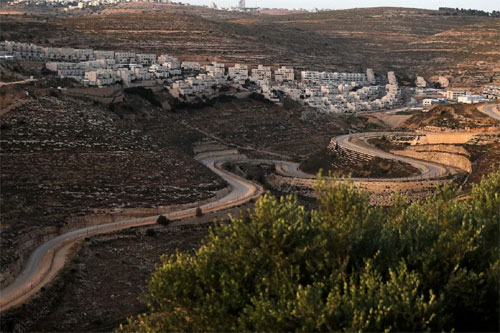Jewish National Fund plans to pour millions into expanding West Bank settlements
The board of the Jewish National Fund (JNF) is set to approve a new policy on Sunday that will allow the organization to officially purchase land in the West Bank for the potential expansion of Israeli settlements there, according to a draft resolution I obtained.
Why it matters: A non-governmental organization founded in 1901 to purchase land for Jews to settle in Ottoman Palestine, JNF today owns 15% of all the land in Israel. This major policy shift could funnel hundreds of millions of dollars into the expansion of West Bank settlements, which are considered illegal under international law.
The move comes as the Biden administration begins to roll back Trump’s policies to legitimize settlements.
It was driven by pressure from the Israeli settlements lobby, which has set a goal of growing the population of Jewish settlers in area C — the 60% of the West Bank that is fully controlled by Israel — to one million, from around 400,000 today.
The backstory: Since 1967, JNF refrained from direct involvement in buying land in the West Bank, partly due to the objections of [US] American donors.
For many years, JNF was controlled by the center-left Labor Party, but has since October been headed by a right-wing, pro-settler politician.
Right-wing parties have managed to take over most leadership posts in Zionist organizations like the JNF, which are a major source of funding and political appointments for Israel`s political parties.
Details: According to the draft resolution, JNF will operate in the West Bank to develop settlements through projects, education, forestation and environmental protection.
The resolutions stresses JNF will only purchase private land owned by Palestinians, which will be used to expand existing settlements, not build new ones.
JNF will not purchase lands in areas A and B — the 40% of the West Bank that is fully or partially controlled by the Palestinian Authority.
The land to be purchased must be inside the jurisdiction of an existing settlement or immediately adjacent to it.
Foreign donations will only be used to buy land in the West Bank if the transactions are legal according to the law in the donor’s country.
The resolution includes a list of priority areas for buying land, including the Jordan Valley and other areas deep into the West Bank.
Between the lines: Due to its political and diplomatic sensitivity, JNF leaders tried to keep this move under the radar. A hard copy of the draft resolution was delivered by hand to board members, who were asked to keep it discreet, sources familiar with the issue tell me.
Worth noting: In past years, JNF did operate on a limited basis in the West Bank through a sister company.
JNF said in a statement: “Over the years we worked everywhere in Israel including in Judea and Samaria. The meeting on Sunday is intended to approve policy principles based on a legal opinion we obtained. At this stage we have no intention to establish a new area of development in Judea and Samaria.
What’s next: The representatives of the center-left parties on the JNF board are trying to block the resolution.
They claim such a major policy shift is inappropriate during an election campaign, and could create tensions with the new Biden administration.
Update: A State Department spokesman was asked about this report during Thursday`s daily press briefing and said: “It is critical to avoid unilateral steps that exacerbate tensions and undercut the efforts to achieve a two-state solution. This includes annexation, settlement building, demolitions, incitement and payments for terrorists.”
Editor`s note: JNF (also known as Keren Kayemet Le-Israel, Keren Kayemet Le-Eretz Israel and Jewish National Fund for the Land of Israel) has been described in other coverage of this development as an “environmental and nongovernmental organization.” It is a separate entity from JNF-USA and JNF-UK, but both form part of the Zionist International linked to the State of Israel through Knesset legislation such as the Covenant with Zionist Executive (1954, amended 1971) and other arrangements to carry out population transfer and related crimes in Palestine.
Photo: Construction work in the Dagan extension of the Jewish settler colony of Efrat, in Palestine’s Israeli-occupied West Bank on 22 July 2019. Source: Gershon Elinson/Flash90.














